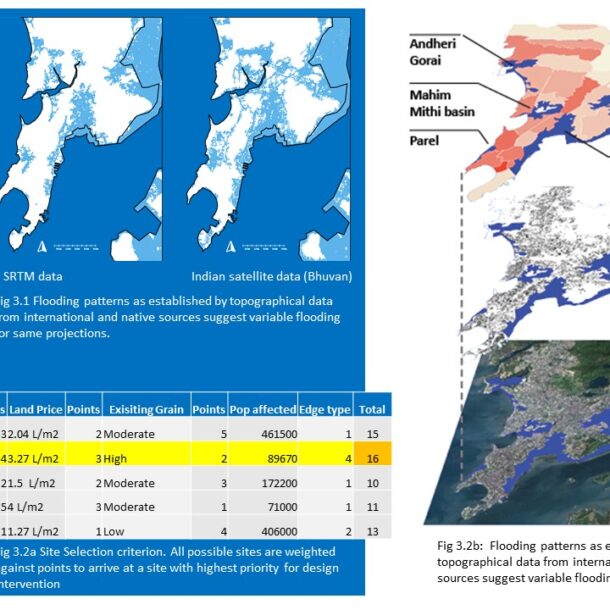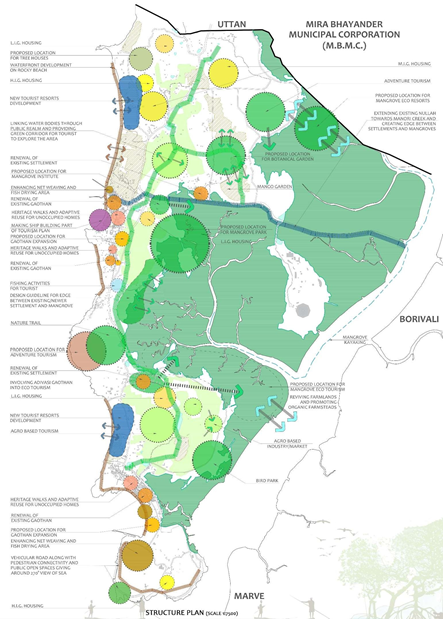
Conjoint model of tourism development and community involvement on ecologically rich area of Gorai Manori
The area of Gorai and Manori has seen immense pressure of development because of its proximity to Mumbai. Many proposals related to tourism were floated for this area but nothing has been accepted successfully by locals. This prevented the area from opening up to drastic developmental changes. The indigenous community of East Indian Christians and Kolis are against this development as they fear that they would land up in the same conditions as the Mumbai’s East Indian villages. Therefore they have objected to almost any form of developmental proposals by the government.
Biodiverse regions threatened by development:
In its Regional Plan during 1996-2011, the Government of Maharashtra planned to develop Manori-Gorai-Uttan area (MGU) as Recreation and Tourism Development Zone (RTDZ). It is observed that after declaration of RTDZ there has been an increase in the number of the resorts, holiday homes and other construction activities in the area. There is no direct connectivity to Gorai and Manori from the main island as locals have opposed construction of bridges thus, tourists have to take a detour from Bhayander. But in August 2017, MMB declared ro-ro connectivity (ferry service to take cars) in Manori creek which will provide direct connectivity from the main island city and which will also reduce the travel time to this area. This transport service will possibly trigger development as it provides direct access from the developed edge of the city. Thus, Gorai and Manori backyards will convert into welcoming front yards for the city dwellers and the trend of development might change.
The region of Gorai Manori has most of its land under ecological elements like mangroves, hillocks, agricultural fields, beaches and water bodies. Almost 82% of the total area comes under CRZ (Coastal Regulation Zone). There is a fear of losing these areas to the haphazard development which might trigger after ro-ro connectivity. Villages here are self-efficient and are dependent on the natural elements present around for their daily livelihood. Villagers fear of losing this method of subsistence because of tourism induced development. Though they are in favour of tourism, they wish to have it in a controlled form which can act as a secondary source of income. The community is of the opinion that it shouldn’t turn into a primary income source for them.

My Vision for Mumbai’s Green Recovery:
Mumbai needs a tourism destination an hour drive from the airport as looking to the global competitors to attract more of the foreign as well as local tourists and increase revenue from tourism. As this region is ecologically biodiverse, the development should be sensitized towards conserving the same. This region being part of Municipal Corporation of Greater Mumbai (MCGM) engenders high development pressures due to high land values, thus the concept of eco-tourism has to be modified in the context of Mumbai. Eco-tourism should be practised to conserve the gaothans, koliwadas, their fishing activities and also catering to conserving green areas like mangroves and agriculture on the land. The other areas should have development as per said guidelines and norms restricting exploitation of eco-sensitive land parcels due to tourism.

The design proposal comprises boosting mangrove tourism in form by educating tourists about its importance by arranging mangrove tours in the form of kayaking/boat-tours and mangrove parks. Boosting agriculture via concepts such as WWOOF-ing (Working Weekend On Organic Farms) and also conserving beach edge and guiding development for expansion of gaothans and koliwadas.

This article thus suggests on guiding eco-tourism considering the natural aspects of the area and having controlled development, considering demands of locals and proposals of planning authorities.
For Mumbai Matters:
Name: Pranav Anyal
Organization: Former student of Pillai College of Architecture
Pranav is a Mumbai based Architect & Urban Designer with experience in diverse range of projects from small scale interiors, architecture to large scale urban development projects. Pranav is currently associated with IBI Group India and is working on Mumbai Transit Oriented Development Project for Metro Line 07.

Waatavaran Climate Environment & Sustainability Foundation is a not-for-profit company incorporated and registered under Section 8 of the Companies Act, 2013. All donations made to Waatavaran are eligible for income tax deduction under Section 80G of the Income Tax Act.
Contact Us
REGISTERED ADDRESS
L-4/906, Swapnapurti, Sector 36, Kharghar, Navi Mumbai – 410210, Maharashtra, India
OFFICE ADDRESS
67/A, Kamgar Nagar CHS,
Behind Madhavbaug, Kurla East, Mumbai, Maharashtra – 400024
Email: [email protected]
Mobile: +91-8850903025 / +91-9221250399
Copyright © 2022 | Site By: Creatiwitty

